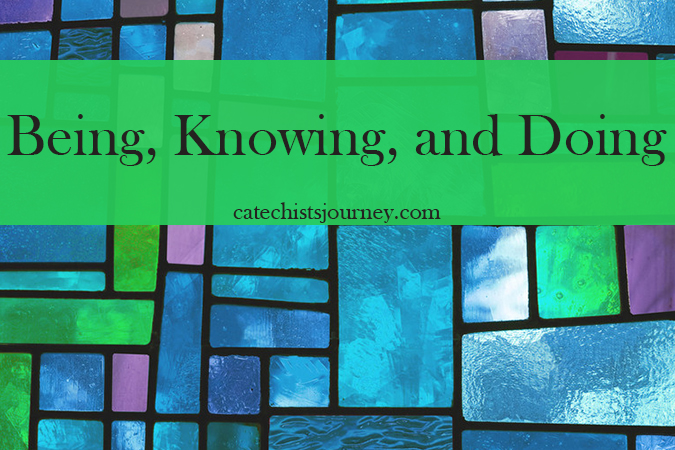
We continue our look at the three dimensions of catechist formation: Being, Knowing, and Doing, this time focusing on the dimension of Knowing.
In their book, Soul Searching: The Religious and Spiritual Lives of American Teenagers, Christian Smith and Melinda Lundquist Denton suggest that the “de facto dominant religion” among today’s young people in the United States can be thought of as “Moralistic Therapeutic Deism.” They surmise that this “religion” is characterized by the following beliefs:
- A God exists who created and orders the world and watches over human life on earth.
- God wants people to be good, nice, and fair to each other, as taught in the Bible and by most world religions.
- The central goal of life is to be happy and to feel good about oneself.
- God does not need to be particularly involved in one’s life except when he is needed to resolve a problem.
- Good people go to heaven when they die.
In other words, when pressed to talk about God, young people are at a loss for words to describe specifically what God has revealed through his words and actions or to summarize, even in general terms, the narrative of salvation history. This is unfortunate, because the truth is, our God has revealed himself and his plan for us through specific words and actions over the course of salvation history. A well-formed Christian should be able to articulate an understanding of that revelation.
I have written before about the need for us to be able to articulate specific knowledge about people with whom we claim to have an intimate relationship. If all I can say about my wife of 40 years is that “She’s nice,” one would wonder if I really know her! If all we can say about God is that he wants us to be nice to each other so we can get to heaven, then we really don’t know God.
For catechists, this is a crucial dimension of our formation: Knowing. We do not have to have an advanced degree in theology, but we need to have the ability to articulate a basic understanding of the Catholic faith (namely, the four pillars of our faith: creed, sacraments, morality, and prayer) and a basic understanding of the narrative of salvation history (and its central themes of rescue, restoration, and reassurance), which is climaxed in the Person of Jesus Christ.
The Catechetical Formation Series, which I wrote and co-hosted with Deirdre Mullane, focuses on the three dimensions of Being, Knowing, and Doing. Sessions 5 through 9 concentrate on the dimension of Knowing.
- Learning Session 5: What We Believe—The Creed
In this session, catechists will develop their understanding of the basic beliefs of our Catholic faith and do an in-depth exploration of the Creed and its components. - Learning Session 6: What We Believe—The Sacraments
In this session, catechists will deepen their knowledge and understanding of the Catholic sacramental life and the Sacraments of Initiation, Healing, and Service of Communion. - Learning Session 7: What We Believe—The Moral Life
In this session, catechists will explore the concepts of human dignity, conscience, and sin, with a special emphasis on the Ten Commandments and the Beatitudes. Catechists will also learn about the principles of Catholic Social Teaching. - Learning Session 8: What We Believe—Prayer
In this session, catechists will pick up where they left off in Learning Session 3, as they deepen their understanding of prayer in all its forms and expressions. Catechists will also learn about the seven petitions of the Lord’s Prayer, the Liturgy of the Hours, and the Eucharistic Liturgy. - Learning Session 9: Understanding God’s Word—Scripture
In this session, catechists will further develop their foundational knowledge of the Word of God found in Scripture with an emphasis on learning how the Bible is put together, how to navigate it, how to locate passages and characters, and how to interpret what we read.
Access the Catechetical Formation Series, and benefit from solid three-dimensional catechist formation (Being, Knowing, and Doing). Also, be sure to check out A Well-Built Faith: A Catholic’s Guide to Knowing and Sharing What We Believe, a resource that will help catechists focus on the Knowing dimension of formation. If you are a catechetical leader and are looking to purchase the book for your catechists, you can get them for $6 each when you buy 15 or more books (in any combination) from the Toolbox series.





Be the first to comment